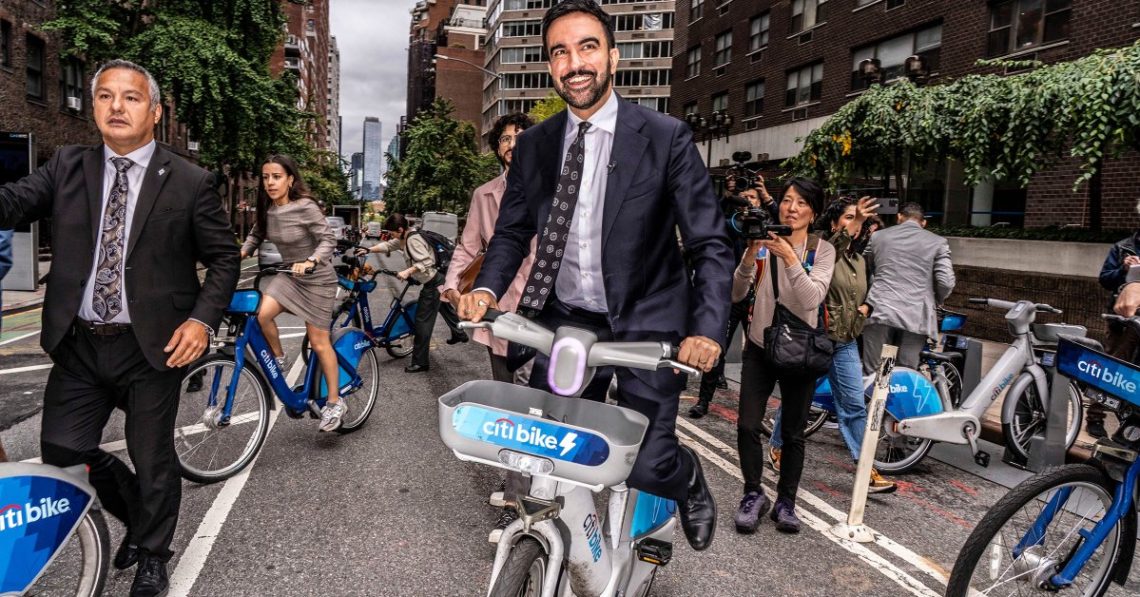In one of his TikTok videos/campaign ads, Zohran Mamdani (suit, tie, no helmet) unlocks a Citi Bike from an Upper East Side dock as someone off in the distance yells “Communist!”
Without missing a beat he replies, “It’s pronounced cyclist!”
In an electoral campaign defined by Mamdani—his youth, that he’s a Muslim, his views toward Israel, and his affiliation with the Democratic Socialists of America—many have missed that Mamdani might become the first New York City Mayor to be a real cyclist, the first Citi Bike Mayor.
The irony should be obvious. Citi Bike is named for and sponsored by Citibank, which, as you might have guessed, is a bank. It’s currently valued at around $180 billion. I’m not sure there’s a more potent symbol of capitalism. Also, Citi Bike is not operated by the City of New York. It’s run by Lyft, the behemoth Silicon Valley ride-hailing company that boasts more than a million drivers (of cars).
Those drivers are relatively low-paid, no-benefit contractors. That’s not socialism. And then there is the mayor who oversaw Citi Bike’s launch. His name was Michael Bloomberg. At various times a Republican, Democrat, and Independent, he is a billionaire who made his riches by way of Wall Street and campaigned for mayor touting his CEO chops. When he won the election, he didn’t move into Gracie Mansion. Bloomberg already had a nicer one. Nobody can (reasonably) call Bloomberg socialist.
Some of Mamdani’s platform, including free buses, free childcare, and city-owned grocery stores, suggest socialist inclinations. His embrace of Citi Bike suggests he’s somewhat of a pragmatist—not the rigid ideologue his critics fear. And it might comfort them to see that he’s more friendly to big business than his reputation suggests.
Mamdani recognizes that the nation’s largest and most successful bikeshare system, a public-private partnership, is actually working.
Transportation in New York City is one of the hardest puzzles to crack. There are 8.5 million people zigzagging across a tiny slice of Earth. It’s a daily headache and, one, that along with public safety, mayors and mayoral candidates have had to address for centuries. The two issues—safety and transportation—are often intertwined and politicized, even if the link between bicycles and leftist politics is relatively new.
In the 1890s, politicians of all stripes lobbied for the “bicycle vote,” a group that consisted mostly of affluent white men. Theodore Roosevelt was a card-carrying member of the League of American Wheelmen, the largest bicycle advocacy group in the nation. He was also a New York City Police Commissioner, overseeing a group of one hundred bicycle police officers. They mainly arrested reckless cyclists.
In 1965, the staunchly conservative William F. Buckley Jr. ran for mayor. He proposed a giant, elevated bicycle highway that would have run above Second Avenue. Buckley lost to John Lindsay, who toyed with less radical ideas, including car-free hours in Central Park and on-street bike lanes. Business owners pushed back over parking. The lanes never came to be.
Ed Koch famously rode the bus to his 1978 mayoral inauguration. And after having visited China and in the wake of a transit strike (Koch encouraged people to bike while waging a public war on the Transport Workers Union), the mayor pushed for bike lanes, this time separated by a curb from motor traffic. Koch was not a socialist. Nor was he a cyclist. In fact, he learned how to ride, practicing on the driveway of Gracie Mansion, only for the purposes of a photo op when he inaugurated the new lanes wearing a funny-looking reflective vest. The lanes lasted only months. It was Democrats who built the bike lanes. And Democrats who killed them.
Koch later tried to ban bicycles from much of midtown in an attempt to rid the city of the growing army of bike messengers. The messengers, he and others argued, were running people over. Plus, the group—mostly men, many non-white, often boldly dressed (or hardly dressed) in ways that looked more like punk rockers or skateboarders than the office suit-and-tie crowd they served—endangered the aesthetic of Manhattan. Messengers had to use side or back entrances when delivering contracts and blueprints and photobooks to banks, law firms, and fashion houses. Some of the bike messengers may have looked like anarchists, but they were serving capitalism.
When Bloomberg and his Commissioner of the Department of Transportation, Janette Sadik-Khan, launched Citi Bike in 2013, New Yorkers across the aisle were irate. Almost nobody thought it would work. The idea of bikeshare was radical in its origins, starting in the 1960s in the Netherlands when a group of revolutionaries scattered white-painted bicycles around the city for people to use freely. But Bloomberg and Sadik-Khan were proposing something very different. Citi Bike stemmed from a practical impulse. The number one reason New Yorkers didn’t bike was safety concerns. Protected bike lanes helped change the calculus. The other reason people didn’t ride was fear of theft. Citi Bike offered a solution for that, too. If you don’t own a bicycle, it can’t be stolen.
One New Yorker who did see the value of Citi Bike was Jeff Blau. He was, and still is, the CEO of Related Companies, a colossal real estate firm. In 2014, he was part of an investor group that propped up Citi Bike to add more bikes and stations. Bloomberg’s and Blau’s approach typified what urban theorist David Harvey has called “urban entrepreneurialism,” a mode of governance that promotes running a city like a business and one that leverages private companies to offer public services. Market-driven and data-informed solutions can, so proponents argue, yield better public services and amenities. Those amenities, in this case bike lanes and a bike share program, can contribute to the city’s brand, which, in turn, makes it more attractive. And, of course, raises real estate values. Harvey, a Professor of Geography at the Graduate Center, CUNY, is a critic of “urban entrepreneurism.” He’s also a Marxist.
Blau and Bloomberg are clearly not and have been spooked by the idea of a Mamdani mayorship. They both support Cuomo. When the former governor talks about Citi Bikes on the campaign trail, it’s usually to push for more strict regulations, specifically when it comes to the e-bike models—pedaling a false notion that cyclists are more of a danger than a victim.
The best way to protect those cyclists is to continue building the network of protected bike lane projects, the ones that former mayor Eric Adams abandoned. Mamdani has vowed to do so. He’s also promised to keep the 15 mph speed limit for Citi Bike e-bikes. Getting more New Yorkers out of cars and onto buses (the faster and freer the better) should help too. Those policies along with his enthusiasm for Citi Bike reflect the likely mayor’s views on the role of government to address safety—as well as his willingness to agree and disagree with his political opponents and back measures that are common sense, socialist or otherwise.
Mamdami, meanwhile, keeps cycling around the city. He doesn’t seem to mind that his bike is emblazoned with the Citigroup logo. He’s not the only one. In the month of September, there were more than 5.4 million trips taken via Citi Bike, collectively covering 9.5 million miles. Riders burned more than 378 million calories. Many of them were commuting to work. To law firms. To banks. To hedge funds. They like them for the same reason that Mamdami does. They’re healthy, often practical, and usually a joy to ride.
Now if the next mayor can figure out—whether by socialism, capitalism, pragmatism, urban entrepreneurism, or some other ism—how to make the city as a whole healthier, more convenient, and more joyful, we should all be thankful.
The post Zohran Mamdani Could Be New York’s First Citi Bike Mayor appeared first on TIME.




